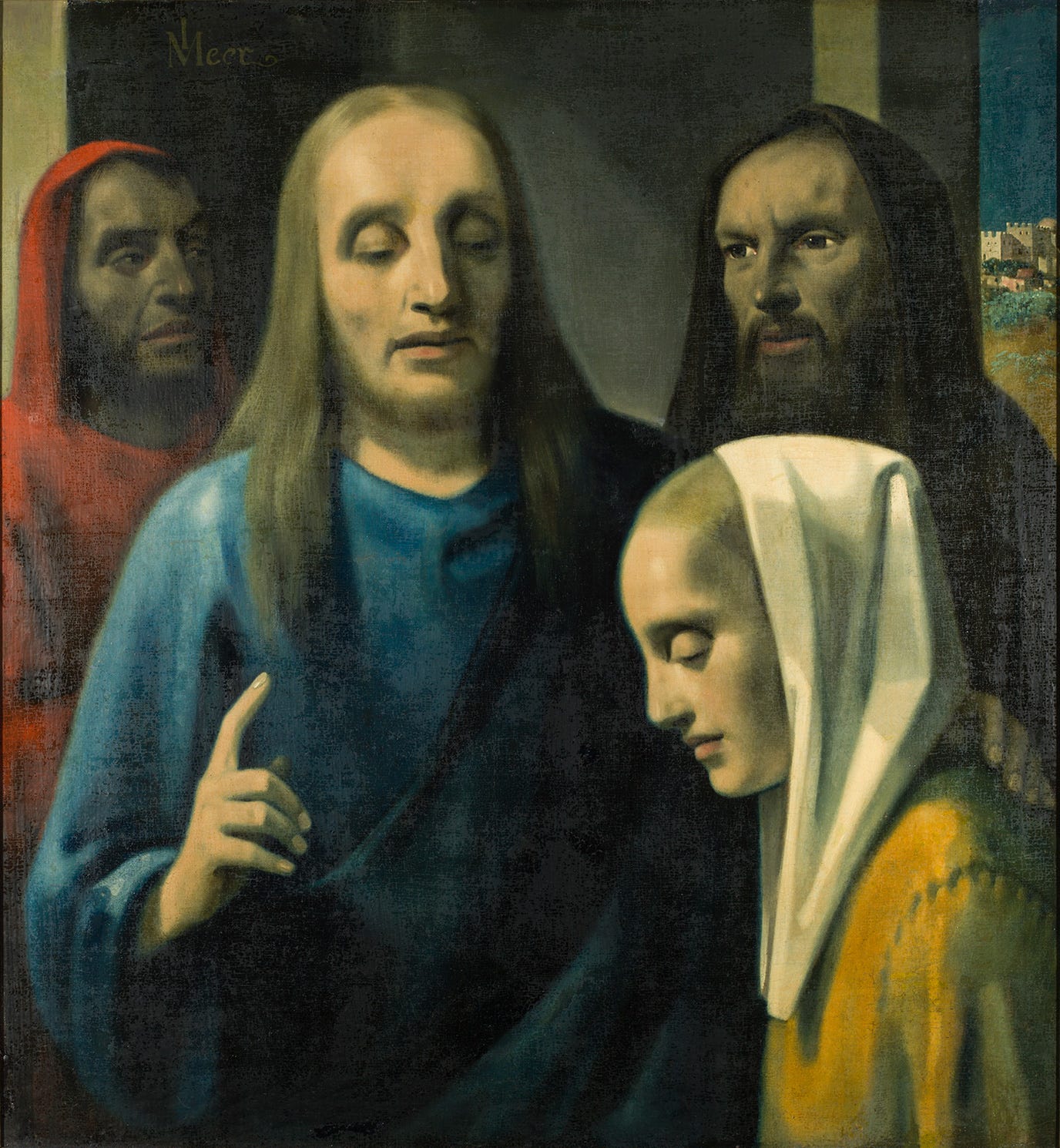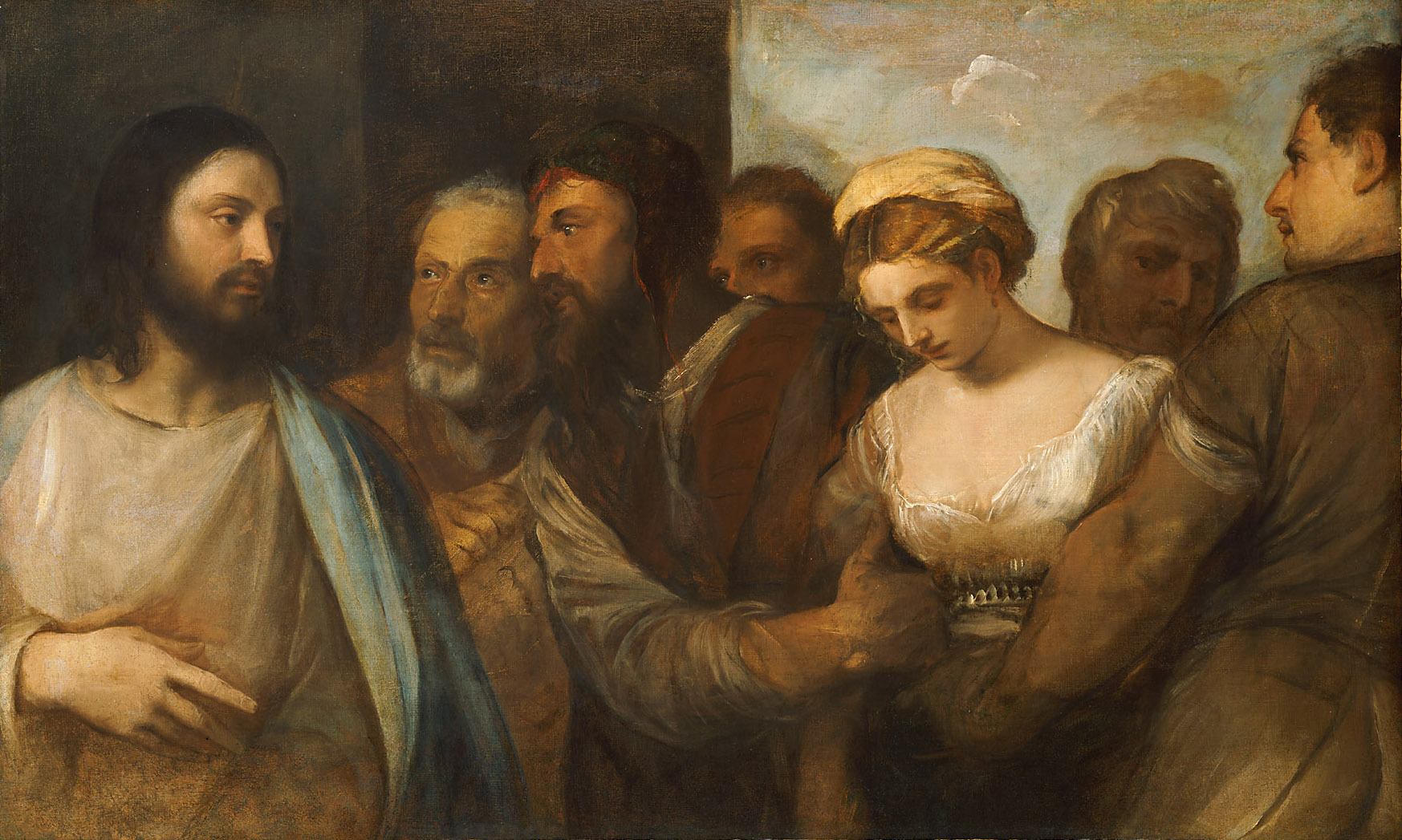
Han
van Meegeren, after Vermeer, Christ with the Woman Taken in Adultery (1942)
As reproduced in The Art of Forgery
How beautiful is the merciful face of Jesus, he is God and is love, and love that forgives, love that takes pity on our failings, love that saves. The scholars of the law and the Pharisees were not as much interested in following
Jesus' teachings as they were in accusing him of going against the Mosaic Law.
But the Master takes advantage of this occasion to manifest that He has come to
seek the sinners, to straighten out the fallen, to call them to conversion and
to penance. And this is for us the message for Lent, inasmuch as we are all
sinners and we all need God's saving grace. Today, it is said that the sense of
sin has been stifled. It is true! There are many who do not know what is good
or bad, nor why. It is like saying —in a positive way— that the sense of Love
for God has been quenched: of God's Love for us, and the reciprocity this Love
exacts from us. He who loves does not offend. He, who recognizes being loved
and forgiven, renders love for Love. Raymond Llull used to say: «They asked the
Friend which was the source of love. He answered, the one where the Beloved has
cleansed our faults». This is why, the
sense of conversion and penance during this last week in the season of Lent is
to confront us face-to-face with God, to look straight into the eyes of Jesus in
the Cross, to personally go and confess our sins to Him by way of the sacrament
of Penance. And, Jesus will tell us, as He did with the woman in the Gospel:
«Neither do I condemn you… go away and don't sin again»[1].
God forgives, and, on our side, this entails a demand, a commitment: Do not sin
again! Let us try, let us do our best, and Jesus will do the rest! •AE
…

Tiziano, Cristo y la Mujer adúltera (1515), óleo sobre tela, Kunsthistorisches Museum.
Hoy vemos a Jesús «escribir con el dedo en
la tierra»[2], como
si estuviera a la vez ocupado y divertido en algo más importante que el
escuchar a quienes acusan a la mujer que le presentan porque «ha sido
sorprendida en flagrante adulterio»[3]. Que
maravillosos la serenidad y el buen humor del Señor aún en los momentos que
para otros son de gran tensión. Una enseñanza práctica para cada uno, en estos
días nuestros en el que no sabemos bien cómo reaccionar a lo que va sucediendo.
La sigilosa y graciosa huida de los acusadores, nos recuerda que quien juzga es
sólo Dios y que todos nosotros somos pecadores. En nuestra vida diaria, con
ocasión del trabajo, en las relaciones familiares o de amistad, hacemos juicios
de valor. Más de alguna vez, nuestros juicios son erróneos y quitan la buena
fama de los demás. Se trata de una verdadera falta de justicia que nos obliga a
reparar, tarea no siempre fácil. Al contemplar a Jesús en medio de esos acusadores
viene a la mente aquello que decía santo Tomás de Aquino: «La justicia y la
misericordia están tan unidas que la una sostiene a la otra. La justicia sin
misericordia es crueldad; y la misericordia sin justicia es ruina,
destrucción». Podemos llenarnos de alegría al saber que Dios nos perdona todo,
absolutamente todo, en el sacramento de la confesión. En estos días de Cuaresma
tenemos la oportunidad magnífica de acudir a quien es rico en misericordia en
el sacramento de la reconciliación. Y, además, para el día de hoy, un propósito
muy concreto: al ver los errores de los demás, también podríamos repetir las
palabras de Jesús: «Tampoco yo te condeno»[4] •AE
No hay comentarios:
Publicar un comentario